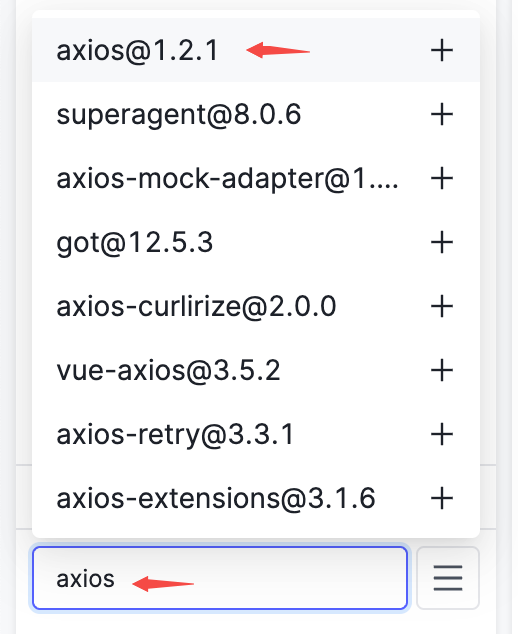Send HTTP Request
In AirCode's Cloud Function, you can use the HTTP library to send requests, such as axios. Note that sending an HTTP request is an asynchronous operation and requires await to wait for it to complete.
After entering and installing the package axios in Dependencies, you can require and use it in the code.

Tips
The use of axios in this article is just an example. You can use any HTTP libraries you like, such as got, request, etc.
Send a GET Reqeust
js
// Import axios at first
const axios = require('axios');
module.exports = async function (params, context) {
try {
// Send a GET request with query params
// Note to replace the URL with your one
const result = await axios.get('https://some.domain.com/info?id=1234');
return result.data;
} catch (error) {
console.log('Something wrong:', error.message);
return {
error: error.message,
};
}
}
// Import axios at first
const axios = require('axios');
module.exports = async function (params, context) {
try {
// Send a GET request with query params
// Note to replace the URL with your one
const result = await axios.get('https://some.domain.com/info?id=1234');
return result.data;
} catch (error) {
console.log('Something wrong:', error.message);
return {
error: error.message,
};
}
}
Send a Post Request
js
// Import axios at first
const axios = require('axios');
module.exports = async function (params, context) {
try {
// Send a POST request with data in body
// Note to replace the URL and data with yours
const result = await axios.post('https://some.domain.com/api/user', {
name: 'Micheal',
age: 28,
});
return result.data;
} catch (error) {
console.log('Something wrong:', error.message);
return {
error: error.message,
};
}
}
// Import axios at first
const axios = require('axios');
module.exports = async function (params, context) {
try {
// Send a POST request with data in body
// Note to replace the URL and data with yours
const result = await axios.post('https://some.domain.com/api/user', {
name: 'Micheal',
age: 28,
});
return result.data;
} catch (error) {
console.log('Something wrong:', error.message);
return {
error: error.message,
};
}
}
Send a FormData Request
With the form-data package, we can send multipart/form-data requests as well, often used to send file content.
js
// Remember to install the packages before using
const FormData = require('form-data');
const axios = require('axios');
module.exports = async function (params, context) {
// Create a FormData object
const form = new FormData();
// Append a text content into it
form.append('a', 'some text...');
// Append a file object into it
form.append('b', params.myFile);
try {
// Send a POST request with this FormData
// Note to replace the URL and data with yours
const result = await axios.post(
'https://some.domain.com/api/upload',
form,
{
headers: form.getHeaders(), // This is IMPORTANT!
},
);
return result.data;
} catch (errors) {
console.log('Something wrong:', error.message);
return {
error: error.message,
};
}
}
// Remember to install the packages before using
const FormData = require('form-data');
const axios = require('axios');
module.exports = async function (params, context) {
// Create a FormData object
const form = new FormData();
// Append a text content into it
form.append('a', 'some text...');
// Append a file object into it
form.append('b', params.myFile);
try {
// Send a POST request with this FormData
// Note to replace the URL and data with yours
const result = await axios.post(
'https://some.domain.com/api/upload',
form,
{
headers: form.getHeaders(), // This is IMPORTANT!
},
);
return result.data;
} catch (errors) {
console.log('Something wrong:', error.message);
return {
error: error.message,
};
}
}
Send Concurrent HTTP Requests
Sometimes, we want to send multiple HTTP requests simultaneously to reduce waiting time. At this time, we need to use Promise.all to ensure that all requests are completed and get the results.
js
// Import axios at first
const axios = require('axios');
module.exports = async function (params, context) {
// Do not use await, so the return value is a Promise object
// Note to replace the URLs with yours
const firstRequestPromise = axios.get('https://some.domain.com/api/one');
const secondRequestPromise = axios.get('https://some.domain.com/api/two');
try {
// Use `Promise.all` to make sure all requests are completed
const [ firstResult, secondResult ] = await Promise.all([
firstRequestPromise,
secondRequestPromise,
]);
return {
firstData: firstResult.data,
secondData: secondResult.data,
};
} catch (error) {
console.log('Something wrong:', error.message);
return {
error: error.message,
};
}
}
// Import axios at first
const axios = require('axios');
module.exports = async function (params, context) {
// Do not use await, so the return value is a Promise object
// Note to replace the URLs with yours
const firstRequestPromise = axios.get('https://some.domain.com/api/one');
const secondRequestPromise = axios.get('https://some.domain.com/api/two');
try {
// Use `Promise.all` to make sure all requests are completed
const [ firstResult, secondResult ] = await Promise.all([
firstRequestPromise,
secondRequestPromise,
]);
return {
firstData: firstResult.data,
secondData: secondResult.data,
};
} catch (error) {
console.log('Something wrong:', error.message);
return {
error: error.message,
};
}
}